Papers by Sarit Ashkenazi
Current Psychology, Jul 27, 2022
Springer eBooks, 2019
The present chapter aims to introduce the Israeli case of mathematical learning disability (MLD) ... more The present chapter aims to introduce the Israeli case of mathematical learning disability (MLD) and general mathematical education. The chapter begins with presenting the greatest challenges of the educational system in Israel: dealing with the diversity of the population, both culturally and socioeconomically, which has deeply influenced the educational system. Afterward, we discuss the essential role of the core subject mathematics in the Israeli educational system. Then we address Israeli students’ performance in relation to international students by summarizing worldwide comparative data.

Applied Cognitive Psychology
The current study highlights the importance of inhibitory ability in facilitating performance in ... more The current study highlights the importance of inhibitory ability in facilitating performance in mathematics. To understand the role of inhibition in mathematical knowledge, this study tested 102 college students on a series of standardized complex math exercises. Inhibition tasks varied by task and stimuli (letters, numbers, and arrows). The result showed stronger associations between math abilities and strength of inhibition with more inhibition found for the flanker task (involving inhibition of peripheral stimuli) than for the Navon task (requiring inhibition of a potential response). The results supported the view that Inhibition in general (which is not unique to numerical stimuli) is associated with math abilities. General, rather than specific inhibition was associated with math abilities and finally, speed of processing masked the relationship between math and inhibition. These results confirm the assumption that the relation between inhibition and math performance is modulated by the task that measures the inhibition, and by additional predictors such as processing speed.
Trends in Neuroscience and Education, 2020
This is a PDF file of an article that has undergone enhancements after acceptance, such as the ad... more This is a PDF file of an article that has undergone enhancements after acceptance, such as the addition of a cover page and metadata, and formatting for readability, but it is not yet the definitive version of record. This version will undergo additional copyediting, typesetting and review before it is published in its final form, but we are providing this version to give early visibility of the article. Please note that, during the production process, errors may be discovered which could affect the content, and all legal disclaimers that apply to the journal pertain.
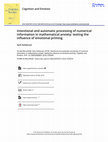
Cognition and Emotion, 2018
Current theoretical approaches suggest that mathematical anxiety (MA) manifests itself as a weakn... more Current theoretical approaches suggest that mathematical anxiety (MA) manifests itself as a weakness in quantity manipulations. This study is the first to examine automatic versus intentional processing of numerical information using the numerical Stroop paradigm in participants with high MA. To manipulate anxiety levels, we combined the numerical Stroop task with an affective priming paradigm. We took a group of college students with high MA and compared their performance to a group of participants with low MA. Under low anxiety conditions (neutral priming), participants with high MA showed relatively intact number processing abilities. However, under high anxiety conditions (mathematical priming), participants with high MA showed (1) higher processing of the nonnumerical irrelevant information, which aligns with the theoretical view regarding deficits in selective attention in anxiety and (2) an abnormal numerical distance effect. These results demonstrate that abnormal, basic numerical processing in MA is context related.
Trends in Neuroscience and Education, 2017
Trends in Neuroscience and Education, 2017
The preverbal representation of quantity has been shown to associate with space, as quantities ar... more The preverbal representation of quantity has been shown to associate with space, as quantities are spatially mapped on a mental number line. One traditional method to test this association is the number line estimation task that asks participants to locate a number on a number line. However, current approaches suggest that number line estimation task performance involves verbally mediated strategies such as reliance on reference points, questioning the nature of the task as a measurement of pure quantitative or spatial skills. To resolve this conflict, in the current study participants performed the number line estimation task in three dual task conditions under phonological, spatial or visual working memory (WM) loads. We found that phonological WM load and spatial
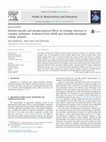
Trends in Neuroscience and Education, 2014
The solution of multi-digit addition problems involves numerous strategies (e.g., retrieval or ba... more The solution of multi-digit addition problems involves numerous strategies (e.g., retrieval or backup strategies). Here, we investigated the role of domain specific factors related to math ability, versus domain general factors such as executive functions on strategy selection and accuracy in complex addition problems. In order to examine the role of domain general processing, typically developed college students were compared to Attention-Deficit Hyperactivity Disorder (ADHD) students due to the ADHD deficits in executive function and sustained attention. We discovered that both domain specific factors and domain general factors play a significant role in the strategy selection process and accuracy. Importantly, domain specific and domain general abilities uniquely impact the complex arithmetical condition (carry over; e.g., 59þ 63) but not the simple arithmetical condition (non-carry; e.g., 52 þ63). Hence, the present finding suggests that superior executive function or superior sustained attention abilities can serve as a compensatory mechanism to low approximate number system acuity.
Methods: Participants included 17 children with DD from the 2nd and 3rd grades and 17 age, sex, I... more Methods: Participants included 17 children with DD from the 2nd and 3rd grades and 17 age, sex, IQ and reading matched typically developing (TD) children. WM was tested using the Working Memory Test Battery for Children (WMTB-C). In two runs of an event-design fMRI experiment, children assessed the validity of single-digit two-operand arithmetic equations (eg 3+ 4= 8). Two conditions, differing in their problem complexity, were compared: in the" Simple" condition one on the operands was always'1', in the" Complex" ...
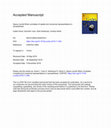
Cortex, 2020
Over-learned semantic representations, such as numbers, are strongly associated with space in nor... more Over-learned semantic representations, such as numbers, are strongly associated with space in normal cognition, and in the phenomenon called number-space synaesthesia. In number-space synaesthesia, numbers are linked to spatial locations in an idiosyncratic way. Synaesthetes report numbers as belonging to a specific location, or feelings that a specific location is the right location for that number. What does really differentiate synaesthetes from non-synaesthetes with respect to their number-space representation? Here we present a number-space synaesthete, MkM, whose number-space representation dramatically differs from that of controls. We examined the impact of spatial distance with respect to MkM's mental number line, and numerical distance with respect to the conceptualized horizontal representation of numbers. In a behavioural experiment, MkM and controls performed number comparison tasks in which they reported either the larger numerical value (number task) or the larger stimulus (physical task) (Experiment 1). A spatial distance effect was found only for MkM. In a brain imaging experiment, MkM and controls compared a single presented digit with an internal reference (Experiment 2). Consistent with the behavioural results, spatial distance elicited significant brain activations only for MkM in different cortical sites including the left supramarginal gyrus. Numerical distance elicited significant brain activations only for controls in the left somatosensory cortex and in the right operculum. We propose that two types of representation are accessed in synaesthesia: one derived by the semantic coding of numbers across space (described by the mental number line), and an explicit spatial representation derived from the position of number within the synaesthetic association.
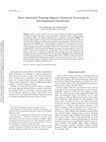
Neuropsychology (journal), 2012
Objective: Recently, a deficit in attention was found in those with pure developmental dyscalculi... more Objective: Recently, a deficit in attention was found in those with pure developmental dyscalculia (DD). Accordingly, the present study aimed to examine the influence of attentional training on attention abilities, basic numerical abilities, and arithmetic in participants who were diagnosed as having DD. Method: Nine university students diagnosed as having DD (IQ and reading abilities in the normal range and no indication of attention-deficit hyperactivity disorder) and nine matched controls participated in attentional training (i.e., video game training). Results: First, training modulated the orienting system; after training, the size of the validity effect (i.e., effect of valid vs. invalid) decreased. This effect was comparable in the two groups. Training modulated abnormalities in the attention systems of those with DD, that is, it reduced their enlarged congruity effect (i.e., faster responding when flanking arrows pointed to the same location as a center arrow). Second, in relation to the enumeration task, training reduced the reaction time of the DD group in the subitizing range but did not change their smaller-than-normal subitizing range. Finally, training improved performance in addition problems in both the DD and control groups. Conclusions: These results imply that attentional training does improve most of the attentional deficits of those with DD. In contrast, training did not improve the abnormalities of the DD group in arithmetic or basic numerical processing. Thus, in contrast to the domain-general hypothesis, the deficits in attention among those with DD and the deficits in numerical processing appear to originate from different sources.
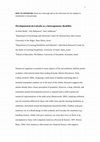
Oxford University Press eBooks, Jul 1, 2014
Numerical cognition is essential to many aspects of life and arithmetic abilities predict academi... more Numerical cognition is essential to many aspects of life and arithmetic abilities predict academic achievements better than reading . Acquiring a solid sense of numbers and being able to mentally manipulate numbers are at the heart of this ability. Research suggests that infants already show a basic perception of quantities. However, a long, effortful, and sometimes painful developmental process is required until a child acquires the numerical representations in the adult sense . Studying arithmetic may be extremely difficult for those who suffer from specific learning disabilities in arithmetic, henceforth termed developmental dyscalculia (DD). Children with poor numeracy are at a disadvantage in both academic and everyday life situations (e.g., handling money). Adults with poor numeracy are more than twice as likely to be unemployed as those with competent numeracy . Poor numeracy often means low financial literacy with negative

Clinical Neuropsychologist, Aug 1, 2011
Developmental dyscalculia (DD) is a congenital deficit that affects the ability to acquire arithm... more Developmental dyscalculia (DD) is a congenital deficit that affects the ability to acquire arithmetical skills. Individuals with DD have problems learning standard number facts and procedures. Estimates of the prevalence rate of DD are similar to those of developmental dyslexia. Recent reports and discussions suggest that those with DD suffer from specific deficits (e.g., subitizing, comparative judgment). Accordingly, DD has been described as a domain-specific disorder that involves particular brain areas (e.g., intra-parietal sulcus). However, we and others have found that DD is characterized by additional deficiencies and may be affected by domain-general (e.g., attention) factors. Hence "pure DD" might be rather rare and not as pure as one would think. We suggest that the heterogeneity of symptoms that commonly characterize learning disabilities needs to be taken into account in future research and treatment.











Uploads
Papers by Sarit Ashkenazi